Luke Combs’ Manager, Chris Kappy: Exclusive SmartistU Interview
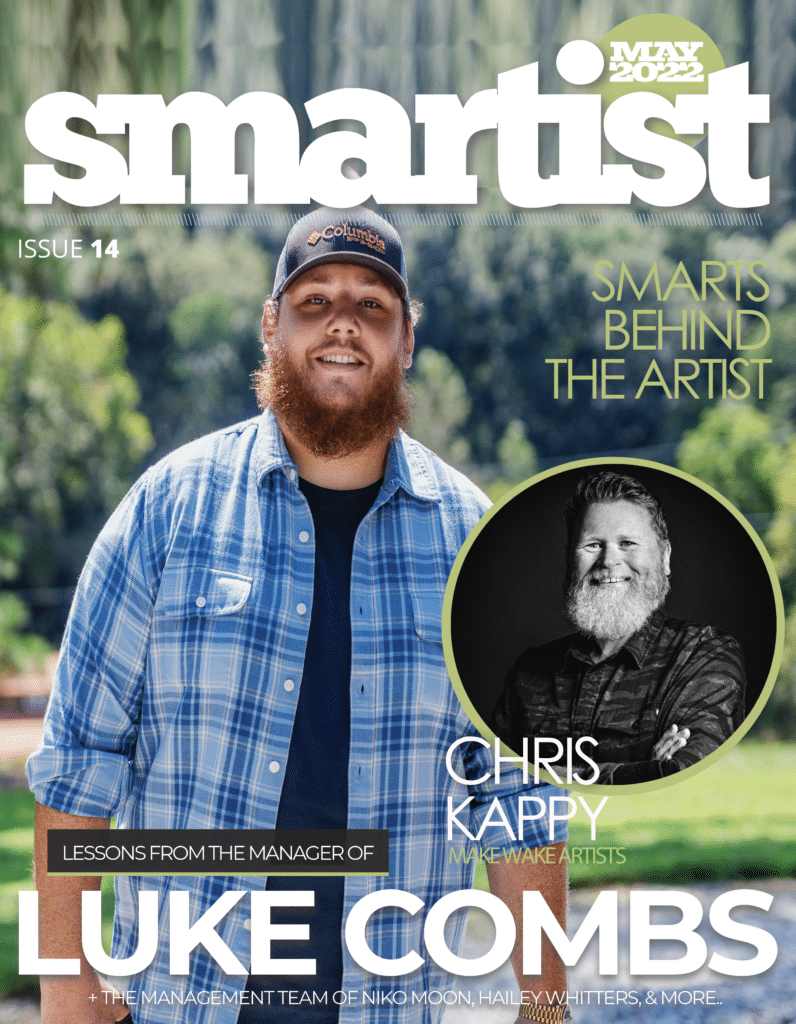
In this edition of Smartist Magazine: Smarts Behind The Artist, we hear from Chris Kappy, owner of Make Wake Artists and current manager of country superstar Luke Combs, among many others.
Kappy has built Make Wake Artists into a management company of innovative thinkers striving to make clients’ dreams come true. Built on accountability, communication, and love, he is unapologetically different.
Now in his 6th year with Luke Combs (Sony Music Nashville), Kappy has grown his roster of managing songwriting artists that are in demand globally: Niko Moon (SMN), Hailey Whitters (Big Loud), Flatland Cavalry (Ind), Drew Parker (Warner Nashville), Tyler Dial (Virgin), Red Shahan (Ind), The Panhandlers (Ind), Jackie Lee (Ind), and Keller Cox (Ind).
He’s immersed himself into the artist’s career by actively attending their shows, talking to fans, and including the fans in the decisions from merch to song choices to being in music videos. He has also embraced new technologies and services for the fans that combat ticket scalpers and makes sure the fans get the tickets, not the secondary market.
In a previous life, Kappy spent 15 years with fan experience company, Sixthman, doing over 85 full ship festival charters, working with the likes of KISS, John Mayer, FGL, Zac Brown Band, Paramore, Brandi Carlile, and many more “fan-based” artists. He handled Partner and Artist relations and fan interactions with the bands and their fans onboard.
Kappy resides in Nashville, with his 2 rescue dogs.
Kappy joined me and our members for a live interview and coaching class Q&A in our private membership, The Managers Club. This article is a transcribed snippet of that class, titled, “How To Build Superfans For Your Artists”.
To watch the full 1-hour recording, and attend these private classes every month, Join The Club.
In this interview we learn:
- How he went from working in tech to working cruiseship music festivals with artists like John Mayer, Florida Georgia Line, and Paramore.
- How seeing the true vision of the artist is the ultimate solidifyer of an artist/manager relationship.
- How things work out when you follow your dreams and aim for no regrets.
- How he goes against lawyer recommendations, but it works for him.
- What his operational structure is at his company, to help keep his artists happy.
- His experiences signing new artists, letting go of artists, and being fired by artists.
- His best advice for negotiating with artists.
“What was your very first music gig? How did you get into this whole thing in
the first place?”
Yeah so in college, I went to school at Georgia State University and, you know this back in the nineties and we would bring in, you know, live bands to play at our frat houses. And I just loved it. I loved live music. I loved everything about it. I loved the idea of putting on a show and dealing with that. And then I went and worked the door at a bar in Atlanta called the Chameleon Club, which was a 500 cap hole on the wall dive bar that anyone from Creed to Hootie & the Blowfish played at, and I saw all kinds of bands go through there.
Then, in 2000 I was working in technology. I was working for a company called Interland, which later became web.com and I was selling hosting. I was just a sales rep and my best friend came to me and said, “Hey, I’m starting this company called Six Man. We’re gonna do music festivals on cruise ships, and you should come and work for me and I’ll pay you a third of what you’re making now and you’ll work in the music business”. And I was like, that sounds like the best idea in the world. So I quit my job and I went to go work in the music business.
Essentially we were chartering a normal cruise ship that you would see that sales out of Florida. We would go to somewhere in The Bahamas or Mexico, and we would take bands and their fans on vacation. We started with a band called Sister Hazel, which is one of the first bands that really got me into the music business. We started with an event called the Rock the Boat, and so for 15 years, all I did was work with bands that had super passionate fan bases. It was about creating opportunities for artists, managers, fans, and brands, to have an immersive experience together in a venue that was untraditional, as well as seeing their favorite artist in a room that would normally be one fourth or one fifth the size, where there was like, you would see KISS in an arena, we only took 2,500 people on this ship. So you got to see bands like that. Paramore, John Mayer, FGL you got to see them in a very intimate experience.
We worked really hard to create opportunities for the relationship. I talk about this all the time, the relationship of an artist and a fan – a “45 to zero” relationship. When an artist is standing on a stage, looking at their fans, they’re looking down on them. It’s a a position of power and I hate that. I hate that entire concept, but you have to do it because you have to have a stage and people have to see them, but you have to be able to get the artist and the fan on the same level. I call it “zero to zero” and zero is not a negative. It’s actually a positive number. It’s how do you do that? I would always work on the cruise ships and see how can I get this opportunity to happen.
So we would. We’d create opportunities to do fun things and, and it worked, and I started to see that. What I learned was that a fan is a fan is a fan. It doesn’t matter if they’re a fan of Paramore, or they’re a fan of KISS, completely different ends of the spectrum, but a super fan is a super fan.
That’s all I did for 15 years, 12 weeks out of the winter, I was immersed in superfans all the time.
[How he met Luke Combs]
Fast forward to 2015, and I meet a guy named Luke Combs, playing in a bar and I see him and I was like, this guy has it. Now you gotta remember on these cruises, we would have 30 bands. They would all play three times. So I’m seeing over a hundred shows every time we did a four day cruise. When I saw Luke and the reaction that him and his fans had. He only had, you know, six songs out, two EPS. I was like, this guy has it, this is my guy. This is who I need to manage.
I convinced him to let me manage him. The way that it kind of worked out was he met with three other managers before deciding to meet with me. All three of them told him that he was not an artist. All three of them told him he was a great songwriter, but he was not gonna be an artist. So, he called me up and said “Hey, I met with the three managers”.
And I said, great. And I asked him to meet with them. I told him, “I want you to meet with these people. I want you to feel that you have exhausted all options, if you’re gonna finally decide on me.” After that he met with me and said, “what do you want me to do? “. I asked him what they said and He goes, “No, no, no. What do you want me to do?” I told him I wanted him to stay on stage every night. I wanted him to sing his songs. I want him to connect with the crowd. I want him to make fans, I’ll handle everything else. He goes, “Alright, when can you move to Nashville? You’re my manager.”
I was like, “Wow, how did that happen? I mean, you met with some of the best companies in all of Nashville.” He’s like, “all of ’em told me I was just a songwriter. None of ’em saw me as an artist.”
Not one of them saw him as an artist. That’s pretty telling, because I think what you have to do is, the second I saw him, I was like, this guy is an artist. I knew it like that. The first time he belted out a song, I knew it, like this guy had it. And just because he didn’t fit the mold of what Nashville liked, everybody else was down one lane. And I was like, well, I’m gonna go down this lane over here. And, you know, Make Wake has kind of been that as a company. We’re kind of like the land and misfit toys. You know, we’re really a big believer in not judging a book by its cover, judging the person by their talent and their character. And that’s why the roster is so, so diverse.
I have, you know, Luke Combs over here and I have a Nico Moon over here. I have a Flatland Cavalry over here. I have a Haley Whitters over here. Every single one of them is different, but they all are songwriters. They all sing their songs and they’re all very passionate about the fan base and what they do. I know I skipped over probably a bunch of stuff and everything, and hopefully we can fill in bunch, but that’s kind of how it all happened. I met Luke and started from there and we just kind of kept moving in that direction to where we are today. Now it’s seven years later.
“That’s amazing. It just seems like it was so meant to be. When you met him, you weren’t already a manager?”
No, I wasn’t. I’ve always wanted to be a manager, always. In fact, I was supposed to manage Nico Moon back in 2008 or 09, he was just signed to Southern Ground, which was Zach Brown, had just did a deal and I was gonna manage Nico. I had come up with a whole marketing plan and all kinds of stuff. And then he’s like, “Hey, I gotta go get managed by Zach Brown’s managers, because he signed me to this deal.” And I was like, all right, fair enough. I mean, I get it.
I put it on the back burner and I was living for a short stint in CA and my best friend had called me and said, if you don’t come back and manage somebody, you’re gonna regret that for the rest of your life. This is a guy named Bradley Jordan who runs Peachtree Entertainment. And Bradley is my best friend. I mean, he’s my best friend in the world. And he said, if you don’t do this, you’re gonna regret it. And there’s nothing worse than regret. There’s nothing. I mean, absolutely nothing. So, when that happened, I was like, all right, I’m gonna move back. Four months later, I met Luke.
In fact, I met another artist in that process and I was gonna manage him. And I found out on Facebook that he signed with a different manager. And then I called him and I was like, “Hey man, I thought I was your manager.” He goes, “oh, no, no, no, you’re my, you’re my tour manager.” I was like, “that’s not, I am, I’m not your tour manager. I am your manager. ” He’s like, well, I got signed by this artist manager. I said “I was talking to, you know”, he was just like, well, I want you to do this. I was like that’s not what I want be, I wanna be your manager. He’s like, “well, I can’t not sign with this person. They have so much more clout and connection and stuff than you. I was like, that’s fine. You gotta do you, man, go.
And then, you know, a couple weeks later I met Luke. So I’m, I’m okay. I’m very happy that it worked out the way that it did, because I might not have decided to work with Luke if that artist had signed on. So it all, it all works out in the way that it does, but that’s how it started.
“I was gonna ask you about the negotiation process, but I guess there probably wasn’t much. ‘Cause he was just like, come on, move to Nashville. You’re it.”
No negotiation actually.
One of the things that we do is I don’t have any contracts with my artists. I don’t have a single contract. Everything’s done on a handshake. If your word isn’t good enough and your handshake isn’t good enough. And that goes to both sides. I mean, it’s not just me, but it’s also the artist. Like, look, if you’re going to give me your word and you’re going to follow through and we’re gonna set this thing, then let’s go. That’s kind of how we we’ve done it. And so we do everything on a handshake.
I mean, it makes my lawyer absolutely crazy. I feel that if my word isn’t strong enough and me looking you in the eye and shaking your hand and giving you my word, what’s a piece of paper gonna do.
And, look, I could get burned on the other side of it being like, well, I’m just not gonna do this. And at that point, luckily the state of Tennessee has certain laws in effect that kind of protect me in certain ways. But at that point, I mean, what are you gonna do? It actually motivates me not having a contract. Cause I’m like, look, this could go away at any time. They could walk in one day and just be like, you’re fired. What that does is it actually keeps me motivated to keep doing things and moving things forward.
I try to explain that to my I team. We have basic industry standards or sunset clauses, which are designed to protect you and stuff like that. There are deals that people have that are managers in perpetuity or have a cut of something forever. Which I just don’t believe in. I just don’t think that’s a fair thing. Again, I’m very nontraditional, in the way that everybody else does it, but I’m okay with that. I like being different and I think my artists appreciate that. I know a lot of managers that have gone off no contracts for 20, 30 years. Lawyers definitely don’t recommend that a lot of managers don’t recommend it either, but if working with honest people, then you’re fine. You’re good to go.
“How do you make your artists happy?”
I mean, we’re a very, as I say, ‘top heavy’ management company. We have 17 full-time employees for 10 artists. That’s very top heavy. Usually you don’t have that much. Usually it’s more of an equal number or maybe even a little bit less, because a manager can handle a couple of artists and stuff like that. But you know, we’re very top heavy here, but that that’s done by design.
I have a full-time merchandise person, that’s all she does is merchandise. And I have a full-time label service. I have a full-time project manager, a full-time DSP partner. So they are there to handle those situations as well as having day-to-day managers. And I also have what I call management coordinators. So these are people that support the managers and help them so they can really focus. If there’s like a thing where we need to enter dates into our touring app or stuff like that, they can do that grunt work and learn the industry that way. It’s a little nontraditional again, but it works for us.
“How did you sign your second artist after Luke?”
Drew Parker was our second artist that we signed here and Drew came through, I mean, Drew was at– Luke’s first show that I met Luke was at the 40 Watt and then met Drew. He is an amazing songwriter and what we were doing was getting his career kind of going. Drew wrote “Forever After All”, one of Luke’s biggest hits. He also wrote the current radio, single “Doing This”. He wrote, “Home Made” for Jake Owen, just an unbelievable songwriter. And then we really got his career going actually during COVID. It kind of shot up. We put a song out called “While You’re Gone” and it took, and then The Highway picked it up and we actually ended up getting him a record deal through that. But Drew was number two.
[Signing, separating, and firing]
Hailey was number three, Nico was number four. It just kind of started to go from there and I’ve had other artists in that time frame. I mean I’ve probably either separated from or I’ve been fired by probably by six or seven total artists in that time frame too. Which it doesn’t always work out there, there’s creative differences. There’s differences in how I work and my team works and how much we put into it. I always say if my team is putting in, or if I’m wanting it more than you want it, then it’s just never gonna work.
I mean, I can’t want it more than you. If you’re not invested in as much as, as all of us are, in fact you should always be one step more invested than I am. I can’t want it more than you. And then if I do, that’s where it kind of gets sideways, and we’ve had a couple of those situations and you know, we’ve also had some situations where people are like, well, you’re not giving me enough time, you know? I’ve learned a lot from that.
We’re a big believer in the term “fail forward”. I failed and I just get up dust myself off and keep moving forward. That’s how it works! Luckily, I’ve learned a lot from those experiences. I’ve taken a lot from those to say, you know, what could I have been better? I look at it at a very introspective way to make me a better person and, I think it does.
[Having Difficult Conversations]
I have hard conversations with my artists. I had one just yesterday with one of the artists. It was a great conversation. When we got done, we talked about how nice it is to be able to have these conversations with each other and nobody gets mad. I think that’s just on the relationship that you have with everybody, you know, you can’t be afraid to have those tough conversations. You being a yes person is not a benefit to an artist. You have to be able to say, I disagree. As long as you’re heard, and then we all move forward in the same direction. Like if, if we say, “Hey, look, we’re gonna go do this. I think we should do it this way. We’ve all agreed that we’re gonna do it this way. It’s not the way I’m gonna do it, but we’re gonna move forward”. And then we’re going to go that way. We never do. I told you, so we never do any of that kind of stuff. It’s like, look, sometimes you have to take these chances in these risks and, and do a certain way. So we’re very, like I said, we’re a very collaborative, adaptable group of people over here.
“You’ve done obviously a lot of negotiating with signing several artists. What would you say would be your biggest piece of advice when it comes to negotiating?”
Make it a win-win environment.
I have all the leverage in the world I have, as people say, I could stand on people’s necks as they say in the industry. I have a ton of leverage and I don’t do that. I try to negotiate three points. I try to look at a situation like- if I want do a record deal, I look at three points. I know what they want. I know it’s important to them. I know it’s important to me. And if you get into this giant red line thing where you’re going through all kinds of stuff, it just, it doesn’t work. There’s just too much going on. So if you can kind of go in with three points, pick out what those points are gonna be. Sometimes it’s five. If it’s a big deal, it might be five.
It’s a win-win situation. If you make it a win-win environment and it’s done with poise and it’s done with character, just treat people, right. Get it back to them quickly. Don’t sit on it. Do what’s ethically right. I mean, and it’s okay to have those conversations be like, “Hey, look, I agreed. And here’s why.”
When you’re negotiating a deal and they have you in a 360 deal, you’re gonna negotiate about a certain amount of touring that you have a ceiling on top of, okay. It’s like a cap. So everything up to this point, we get to this point, then you start to share in it. Because those early days, let’s say you have a cap of, I don’t know, let’s, let’s use easy numbers, let’s say a million.
Okay. And the label wants to take, or whoever your 360 deal is wants 10%. So that’s a hundred thousand dollars. But if you go back to them and say, look, if you defer that or you waive that first hundred thousand, that amount of money is so valuable to the artist at that stage. Once they get to that point you start sharing it because that first hundred thousand covers a lot of bills that they have to still pay. That’s a huge chunk of that for them. If you go of them and you say, Hey, we are gonna carve out this, this and this- nine times out of 10, in fact, and every deal I’ve done, they’ve never had a problem. And then I’ll even push it. I’ll if they want something else, I’ll come back and be like, not a problem, but we’re gonna carve out it to 1.5 and they’ll be like, okay.
And they do the math real fast. I also try to build in automatic, what I like to I call, self-leveling. So like, you know, you get an artist and you have a certain idea of kind of where it’s gonna go. And then, it pops off and does something really great that if you can work it that way, you can get the contract to auto negotiate itself. So for instance, one of the contracts that I did, I was like, if the album hits platinum status, okay. Which these days is very hard to do with streaming and that kind of stuff. But if it does, it would retro to this. If it hits this, it would retro to this. And they’re like, okay, if that gets to that point, then we’re in such a good spot and let’s do that.
So we built in auto negotiating into the contract. So you don’t have to go back after album two and then start to re-negotiate album three and four, or add albums onto the deal. You just really build it into it. You bet on the fact that you’re gonna get there, you know, and if you do everything self renegotiates for you, so little things like that, that I had never heard of before. I am not the smartest guy in this room right now. Trust me. But what I do is I try to make it a win-win situation. If you’re succeeding and I’m succeeding and the artist is succeeding and we’re all doing our jobs together, why not give a little bit back to the artist? Why not do that? So I think that’s a big part of it, of, of what I really work hard to do, like I said, self adjusting, self negotiating, and options into contracts.
And again, it’s okay to be nice. When somebody gets all worked up and stuff like that, I get calmer. Like, you know, they get really mad. I just get calmer. It’s fine. You know, and that sometimes makes them more mad but I just get very calm. I’m just like, all right, are you done? All right. Great. That’s great. What’s the real problem right now? Like, what’s the problem and why are we in this mode right now? When you do that, you kind of disarm the situation. I try to do that in every aspect of, of my life, if at all possible.
To watch this full live interview and group coaching class Q&A where Kappy dives deep into building audiences of superfans, and attend classes just like this one every month, join The Managers Club.
This article is a transcribed snippet of that class. To watch the full recording and attend these private classes every month, Join The Club.
Check out more interviews here.
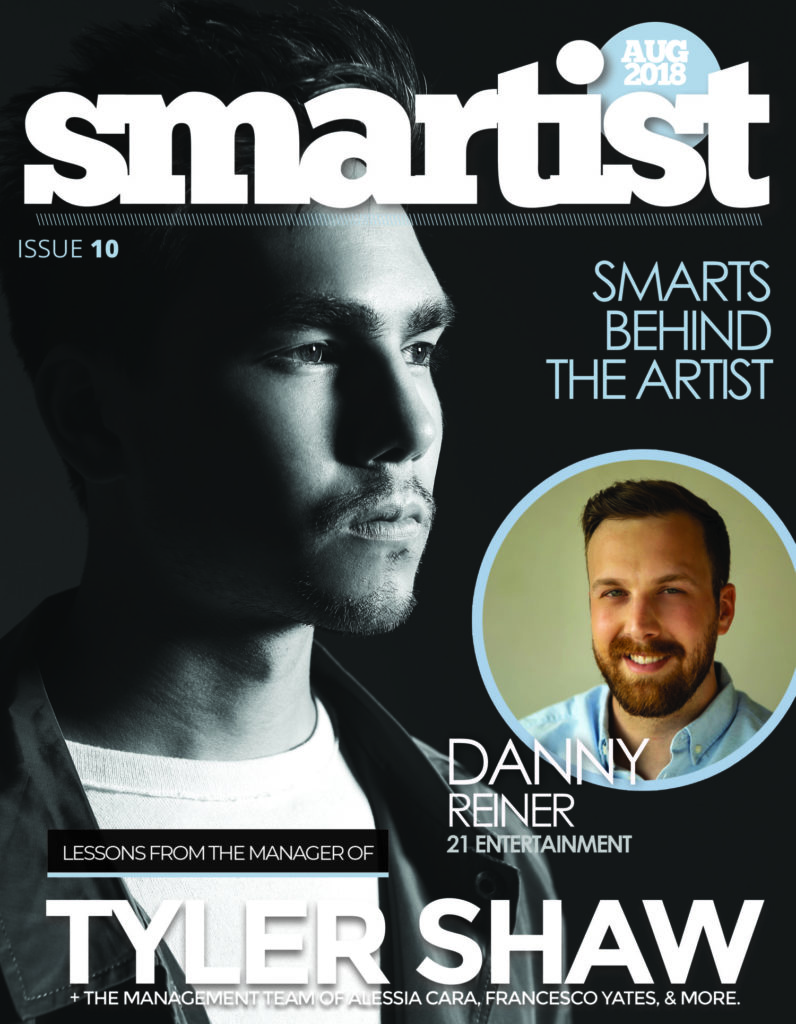
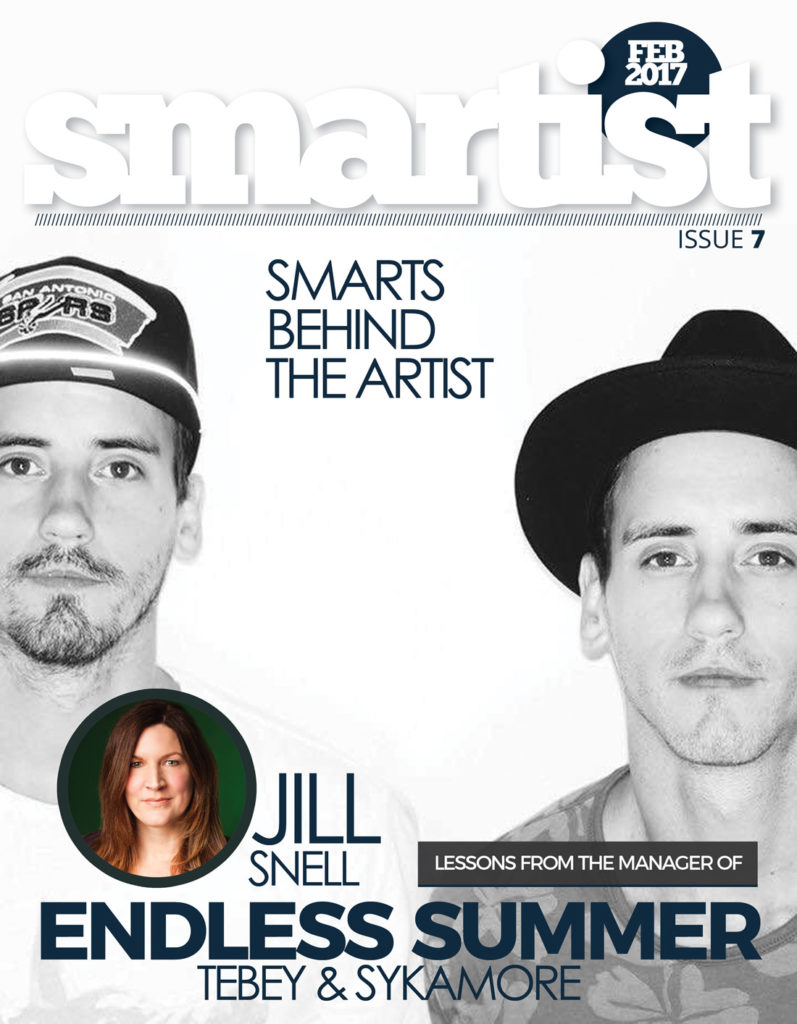
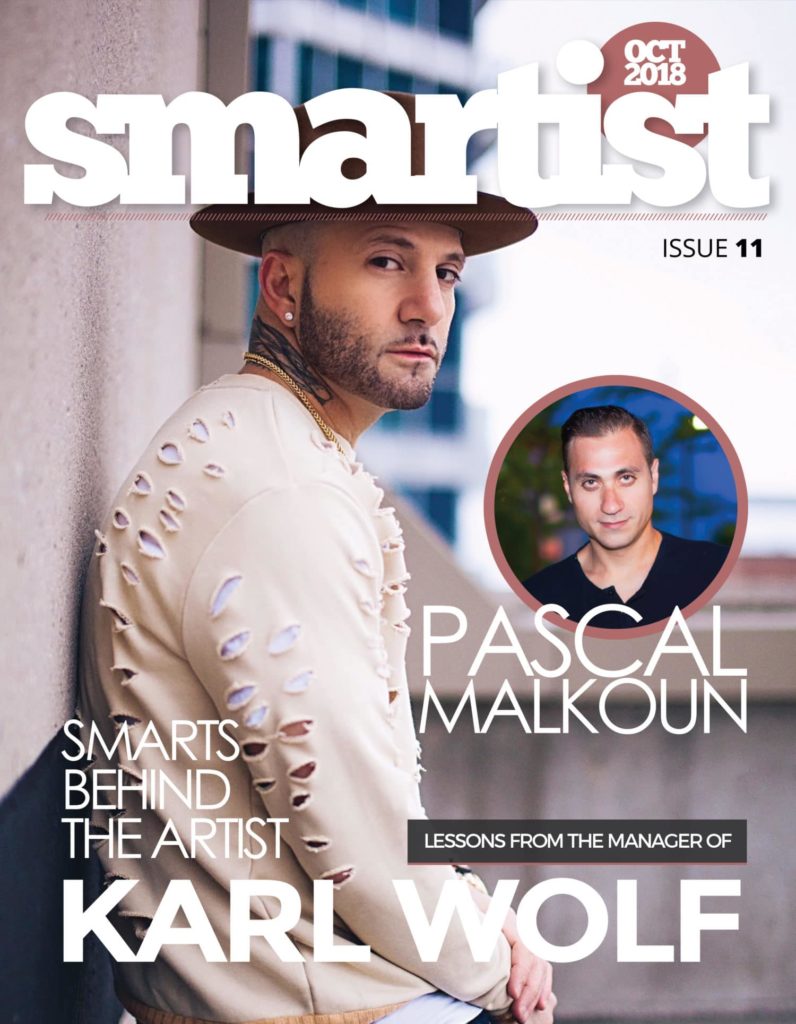
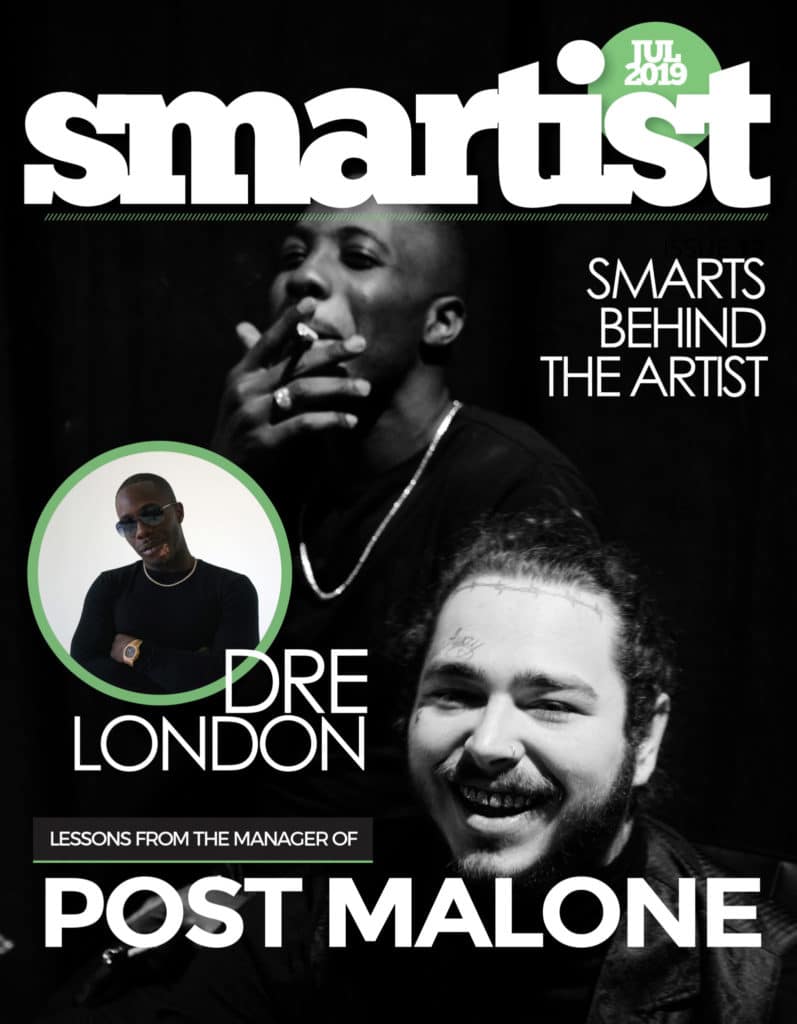
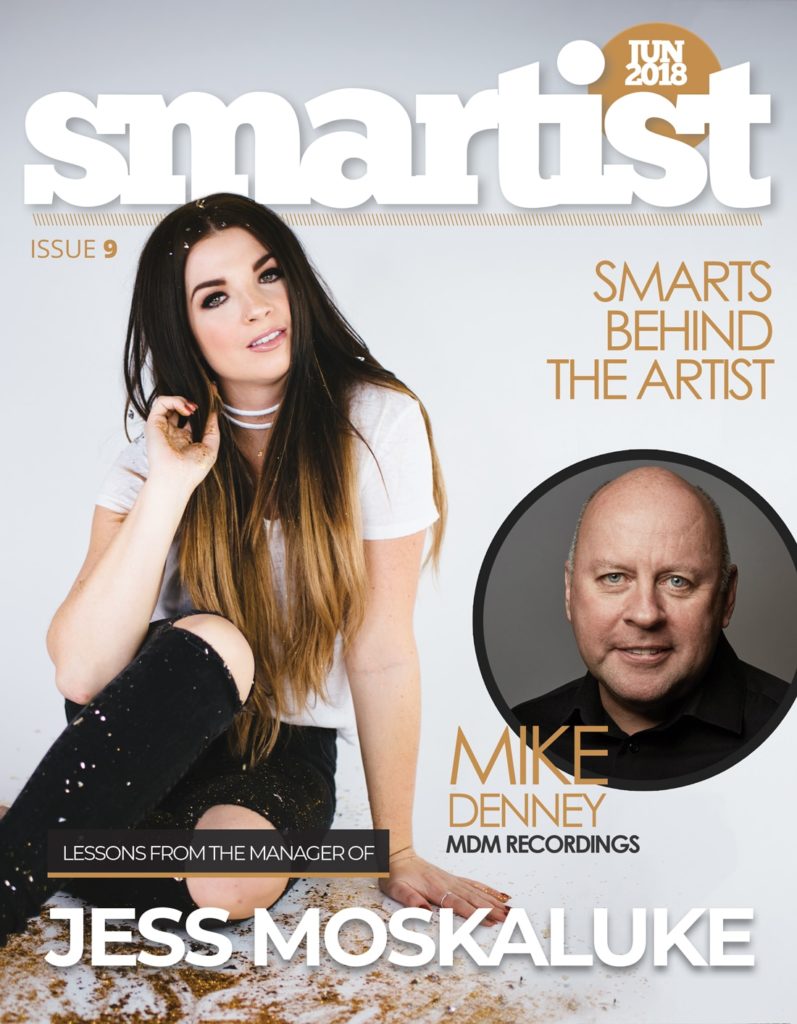
Responses